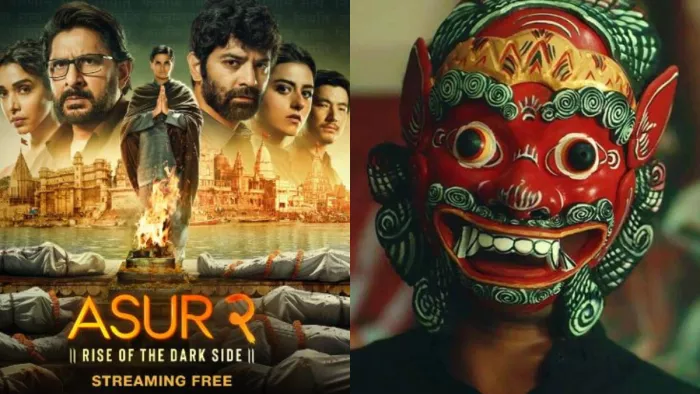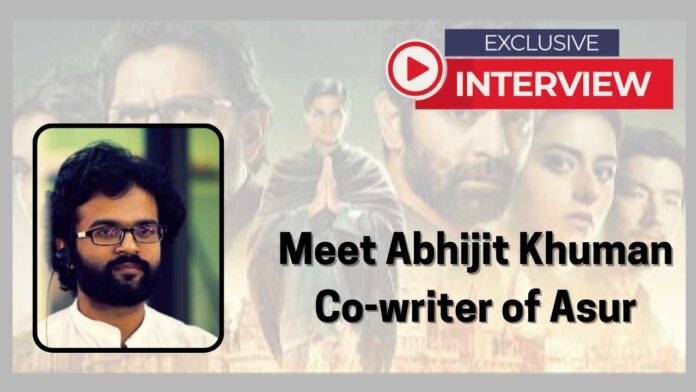Interviewed by – Ayushi Sandhya
Written by – Reetika Choudhury
Edited by – Robin Bhuyan (Editor in Chief)
Enigmatic Horizon brings you an exclusive interview with Abhijit Khuman, who was one of the talented writers of the Asur, one of the most successful and critically acclaimed web series made in India. He has also worked in other projects such as Sudhir Mishra’s Serious Men, where Nawazuddin Siddique had starred in the lead role.
First of all, congratulations on the massive success of Asur, which can be considered your most successful venture as well. Can you share something about the next season – will we be seeing one?
Thank you! Regarding the second season, we can’t disclose that right now. But we are working on something unique, and you’ll get to know soon!
What limitations do you keep in mind while working on a mythological story like Asur, given it’s a very sensitive topic for Indian viewers?
We discuss it thoroughly with the team before implementation. Religion is a sensitive issue in our country, and we have to consider the consequences of our opinions. Unlike in the USA, where individuals have more freedom to express their views on religion, in India, we must be cautious. Our ancient culture shows that prominent figures often debated and critiqued religious texts like the Vedas. In “Asur,” the villain’s nature is based on what is already present in our texts, and we ensured nothing would hurt people’s sentiments. We relied on mythological books for references, confident that our content wouldn’t offend. At the same time, there are no specific limitations; if something doesn’t feel right to us, it likely won’t be well-received by others either. That’s the first barrier we consider.
Another one of your significant works is the film Serious Men. How did you bring the movie to life? We want to know your perspective.
In India, caste and class play crucial roles. Depending on whether you are born in Mumbai or a remote village in Rajasthan, there’s a vast difference in how you live; your destiny seems predetermined. We wanted to highlight these issues, especially focusing on generational migrants. That’s how the concept came to us.

How was your experience working with Sudhir Mishra?
He is wonderful to work with and very knowledgeable. Conversations with him provide deep insights into societal changes and the industry’s evolution.
How do you feel when your movie becomes a hit, and the actors get the popularity?
Well, to be frank, all of my projects are collaborative efforts, and I can’t solely claim ownership of them! My success is not just mine, but a collective achievement. Everyone contributes and shares in the success. As for popularity, we screenwriters generally don’t seek it because it can disrupt our professional space. Writers need a quiet environment to study various topics and develop ideas. Talking to our actor friends, we understand they deal with anxiety, stress, and depression due to their popularity, which isn’t often discussed. It’s always good to be loved by people, but when that love becomes an addiction, it can be harmful. I’ve worked with many well-known directors whose films received recognition in the ’90s and also with contemporary directors. Comparing the two, you see that public admiration is not permanent; it changes over time. So, it’s better not to be overly popular, as it can hinder both your work and personal life.
How do writers deal with financial crunches?
Writers, artists, painters, and many others in creative professions only need enough money to sustain themselves. They don’t require much for their practice; it relies on different resources and a lot of support. Essentially, you need to earn enough to live peacefully. If you’ve heard about the hurdles faced by actors and directors, you know it takes years to become financially independent and involves much hard work. Only a small proportion of people achieve significant success. In India, people often associate films with luxury, assuming anyone in the industry is wealthy, but that’s not the case elsewhere. Like any start-up, you don’t earn profits in the initial phase; it takes time. If you’re passionate, you’ll reach your goals, but it can be frustrating and lead to giving up. Discipline is crucial.
Have you ever felt like you should give up and go back home?
Fortunately, I’ve been blessed in this regard. I finished my education, got opportunities to work as an assistant director, and took breaks when needed. With the support of friends and a bit of luck, I’ve always found work to keep my financial condition stable.
What are your thoughts on movies and series like Animal, Mirzapur, etc. which became hits but were also criticized?
Animal is a well-crafted movie, intense and unique, which is why it was a hit. However, it may not have had a positive societal impact. Critics felt the anti-hero lacked a realization arc, continuing to cause damage without redemption, which disappointed some viewers. This ongoing lack of redemption infuriated a section of the audience. However, if you look at movies like Anurag Kashyap’s Raman Raghav, it is far more problematic, as the lead character played by Vicky Kaushal, tells his girlfriend that he doesn’t give a damn if she gets pregnant and gets abortion for the third time, even if it causes her permanent reproductive disability.
What is your writing process like, and how much liberty do you have in collaborative projects? What types of content do you enjoy writing and observing?
It varies. In personal or individual writing, I prefer the freedom it allows—no restrictions. Collaborative projects, however, are learning experiences. I take them positively, gaining new insights from others.

Is there anyone you would like to collaborate with, any actor or director?
I would love to work with Quentin Tarantino and Christopher Nolan. I admire how their work and craft. However, there’s no one specific in Indian in mind at the moment.
Can you tell us a bit about your personal life?
I’m from Gujarat. I completed my schooling there, then moved to Rajkot for engineering and an MBA. After working for a while, I shifted to Pune for a course in direction and eventually came to Mumbai to start working here.
When people recognize and approach you, what are some memorable or funny moments you’d like to share?
When my series or movie is released, and someone recognizes my work, I feel overwhelmed. It’s a new and delightful feeling.
Have you ever been a fan of someone in the industry during your initial phases?
As a kid, I used to watch Captain Vyom played by Tom Alter. During my time at FTII, he provided a voiceover for my diploma project. Realizing he was the man I admired during my childhood was a significant moment.
Any message you want to give to aspiring writers?
If you want to pursue a writing career in Mumbai, gather your materials first and have a clear plan. Once you’re here, time is limited. So, it is important that you plan ahead before you come here to implement your goals!
